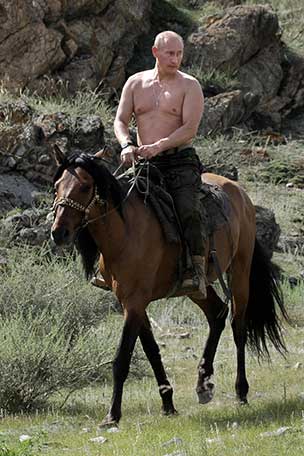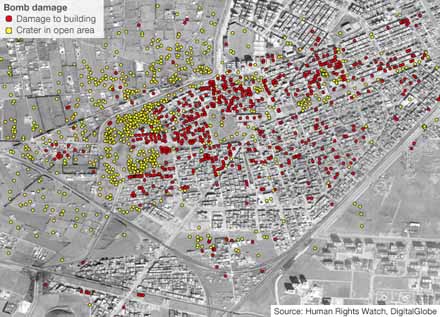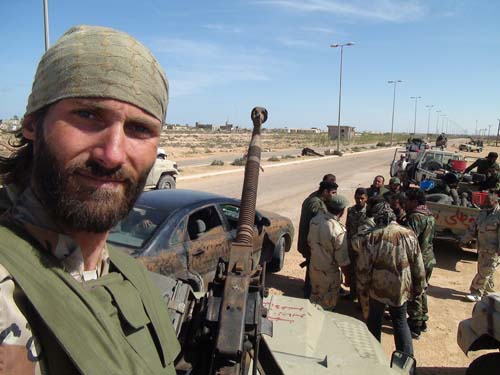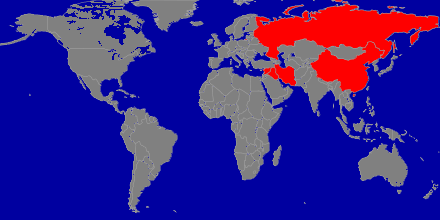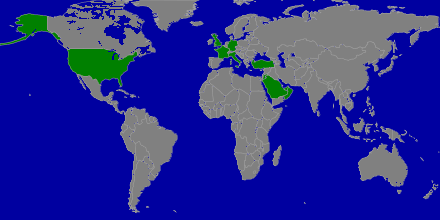The Failure of the United Nations in Syria
Today has proven that the United Nations is powerless to stop the Syrian civil war.
Kofi Annan says he’s “shocked” by the surge in violence and atrocities leading up to the April 10th deadline for Syrian regime forces to cease military operations. Journalists are writing stories that should have been written last week and saved in a folder for publication today – the outcome of this fiasco was that predictable.
The only thing “shocking” about the latest failure of the United Nations is that anybody is shocked by it. The United Nations is a deeply flawed organization unable to accomplish its stated purposes, much less meet the needs and expectations of the multitudes of oppressed and suffering around the world who look to it in desperation as their last and only hope.
The Purpose of the United Nations
The United Nations charter lists four purposes of the organization (I have paraphrased them for brevity) in Chapter 1, Article 1. Unfortunately, some of these purposes are mutually exclusive:
- Maintain international peace and security. The United Nations was founded in 1945 with the primary purpose of preventing a third world war, and to this day peace and security remains the paramount concern of the UN. Everything else is a secondary consideration.
- To develop friendly relations among nations based on respect for the principle of equal rights and self-determination of peoples. With this second purpose the scheme begins to unravel – a large number of UN member countries do not represent the self-determination of their population, nor does the UN make any substantial effort to demand self-determination among its members. Only 78 of the 165 UN nations that are included in the Economist Intelligence Unit’s Democracy Index are democracies, and 52 of the 165 members are authoritarian regimes (the remainder are hybrid systems of government). This creates a situation where a UN vote by the United States represents the interests (through democratic elections) of its 312 million people. Syria, by contrast, represents the interests of one man – Bashar al-Assad, not the 20 million people of Syria. The “friendly relations among nations” are based on respect for the self-determination of a single person in 1/3 of the member nations, not on the self-determination of peoples. In other words, of the nearly 7 billion people represented by the United Nations, the 3.39 billion of them who live in democratic or flawed democratic countries have their interests represented in the UN, while 2.6 billion people suffer the will of 52 despots and their supporters who use UN membership for their own interests.
- To achieve international co-operation in solving international problems and promoting human rights and fundamental freedoms. The UN seeks international cooperation to achieve these goals and has a mixed record of success doing so. The reason is obvious – when 1/3 of the member states are authoritarian regimes with little respect for human rights or fundamental freedoms, how much cooperation can there possibly be on these issues?
- To be a center for harmonizing the actions of nations in the attainment of these common ends. Kumbaya.
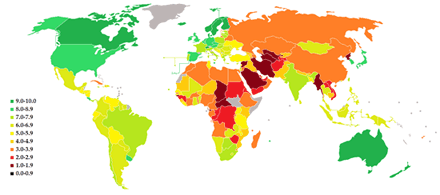
2011 Democracy Index - The United Nations (Dark green countries are the most democratic, dark red countries are the most authoritarian)
The UN Security Council
The UN Security Council is where the power lies with regards to conflicts like Libya and Syria and it is arguably the most malignant cancer infecting the United Nations. The Security Council consists of five permanent members with veto power: the United States, the United Kingdom, France, Russia, and China. The latter two countries are the problem.
How did Russia and China find themselves on the Security Council? The council members were the countries that won WWII. This meant the Republic of China and the Soviet Union, not the People’s Republic of China and Russia. The Republic of China was a democratic country exiled to Taiwan during the Chinese Civil War in 1949, and the communist victors of the war took over the seat at the Security Council in 1971. Russia inherited its seat on the Security Council after the collapse of the Soviet Union in 1991.
For the past 65 years Russia and China have been a force of oppression by acting as the primary backers of authoritarian regimes around the world. Wherever you find a dictator killing his own people you’ll find him using Russian weapons to do it. I was on the receiving end of Russian bullets, rockets, and mortars while fighting in the Libyan civil war. China boosts authoritarian state economies with foreign investment (and supplies them with weapons as well.) Both Russia and China also protect authoritarian regimes through obstructionism on the UN Security Council. In recent years they have successfully shielded Iran, North Korea and now, Syria.
A Security Council with a Communist, authoritarian China and a deeply flawed, quasi-democratic Russia whose foreign policy is focused on supporting authoritarian regimes around the world as permanent members with veto power makes the UN charter’s stated purpose #2 (self-determination) and #3 (human rights and freedom) impossible to achieve.
The United Nations has become like a Superhero who consults the villains before deciding whether to save the city.
Reforming the United Nations
If the United Nations wishes to remain relevant in a 21st century world as an organization that can achieve the goals stated in its own charter, it is imperative that one of two things happen.
- The UN charter is re-written to remove provisions #2 (equal rights and self-determination) and #3 (promoting human rights and fundamental freedoms). Both of these purposes are impossible to achieve with Russia as a permanent member of the Security Council, so the existence of these two stated purposes makes the UN doomed to perpetual failure as an organization.
- Russia’s permanent membership on the Security Council is revoked
The second option is clearly preferable. Many arguments can be made to support revoking Russia’s permanent membership on the Security Council, but three of them stand out as most prescient:
- There is no provision for succession in the UN charter, so the legality of Russia inheriting the seat of the Soviet Union is in question.
- The Soviet Union was given permanent status as a world superpower. Russia represents not only a fraction of the former Soviet Union territory and people, but is far from a superpower – it is an aspiring world power (at best).
- Russia has a pattern of obstructionism through the Security Council that endangers world peace and security, thus undermining the very purpose of the Security Council. Furthermore, Russia’s support of authoritarian regimes makes fulfillment of UN purposes #2 and #3 impossible.
The case for revoking the People’s Republic of China’s membership as a permanent member of the Security Council is more complicated. The People’s Republic of China did succeed the Republic of China as a UN member following their conquest of mainland China in the Chinese Civil War, but United Nations General Assembly Resolution 2758 in 1971 put an end to any effective legal argument against China’s status on the Security Council. Furthermore, China is inarguably a world superpower.
However, China has never vetoed a UN Security Council resolution on its own; China so far has only vetoed when Russia does. Removing Russia as a permanent member of the Security Council would at least encourage China to abstain on some Security Council resolutions it disagrees with rather than be a lone veto.
Unfortunately, the chance of Russia losing its permanent member status is about the same as Assad surrendering himself to the International Criminal Court. The only possible reform of the Security Council is expanding the permanent membership to include additional countries (democratic ones), a proposal that has been gaining support in recent years. This would dilute the perceived legitimacy of vetoes by Russia or China by having more countries opposed to such vetoes.
The Way Forward
Failing to enact necessary reforms that begin with changes in the Security Council, the United Nations will continue to be largely irrelevant beyond its primary mission of maintaining international peace and security, for which it has a mixed but acceptable record of success. For this purpose the UN should be supported.
After today’s deadline on Syria nobody should remain under the delusion that the United Nations can advance freedom, self-determination, or human rights. If anything, the fact that the primary mission of the UN is stability and peace means that it will often be diametrically opposed to the cause of freedom around the world since in many cases, Syria included, freedom and self-determination can only be achieved through war. Peace and freedom are often mutually exclusive concepts and throughout history it has often been revolutions and civil wars that paved the way to freedom and liberty.
Stability means preserving the status quo, and for 1/3 of the world’s population the status quo means living under authoritarianism.
Was Kofi Annan really “shocked” that Assad’s regime intensified military action as the deadline for a ceasefire drew near? Did Annan really believe that he would achieve anything other than helping Assad by delivering a public relations victory and providing the regime with some diplomatic cover as it escalated violence against the Syrian people? Was he just leading the United Nations through the motions of diplomacy, having the UN act to save face so the diplomats could say they tried something? Or is Annan suffering from delusions of grandeur so profound that he really believed he could successfully negotiate the beginning of the end of civil war in Syria and pave the way for the voluntary departure of Assad and a transition to democracy?
Did Kofi Annan, with all his experience and past success, really believe that the Syrian regime, which tortures children, summarily executes its own citizens, and has mocked the international community for decades, could be an honest and reliable partner in negotiations? Could he not predict that the regime would ruthlessly press their advance against the opposition in the days leading up to April 10, taking a deadline as a greenlight for action in advance of it? Is Annan (and the UN at large) so incapable of empathizing with both the Assad regime and the Free Syrian Army that he believed the two sides would negotiate after a year of revolution that has claimed 10,000 lives and left both sides in an all-or-nothing, irreversible position?
But it really doesn’t matter what Annan and the UN was thinking – the end result is very clear. The Syrian civil war will continue, Assad will remain in power, and nothing short of a military victory by the Free Syrian Army is likely to remove him and bring peace and security, and most importantly freedom and self-determination, to Syria.
It is also clear that Russia and China will continue to protect Assad as permanent members of the UN Security Council.
The UN has only one opportunity left to play a role in Syria – persuade Russia that Assad cannot be reasoned with and must be removed from power. It is possible that Kofi Annan knew that Syria would fail to honor the April 10 deadline all along, which would allow him to show Russia that their preferred strategy would not work with Assad and that other measures were needed. The problem with giving Annan and the UN the benefit of the doubt in this case is that Russia should have been able to exert more influence on Assad if they really felt that their ability to support him was in jeopardy, and because it is highly unlikely that Russia will ever back down on Syria; the Russians believe Assad’s rule can survive and they have already invested considerable political capital supporting him.
The United Nations has its uses. The chance of world war is virtually non-existent, partly due to the existence of the UN. Occasionally positive agreements are reached and the UN has managed to extinguish some conflicts before they spiraled out of control. But the UN should never be expected to fulfill any mission of advancing freedom, human rights, or self-determination – it can rarely do so effectively with 1/3 of its members being authoritarian regimes and 2/5 of the Security Council willing to protect many of those regimes using their veto power.
The United Nations is focused on peace, stability, and diplomacy. There is no role for any of this in Syria. Any organization that has peace and security as its primary mission is an obstruction to the cause of freedom in Syria, and any actions by the UN other than military intervention will only serve to strengthen Assad and prolong the suffering of the Syrian people. For every action like today’s expired deadline, the UN will only soil its hands with more Syrian blood by prolonging the war and strengthening Assad’s grip on power.
The time has come for the nations of the free world to act unilaterally in the cause of freedom and human rights in Syria. Let the United Nations be where the democratic countries meet with the 52 authoritarian ones to discuss matters of peace and security. But have NATO do what it can to eliminate as many of those 52 as possible when the opportunities present themselves, as in Syria now.
At the very least, it is time to provide the Free Syrian Army with what is required to win the war. The Gulf Cooperation Council should send arms, Turkey should help establish a buffer zone in Syria, and the West should continue to provide equipment and intel to hasten the fall of the regime.
When the UN is comprised of democratic countries that actually do represent the principles of freedom and self-determination, then we can focus on achieving world peace.
Like this:
Like Loading...
